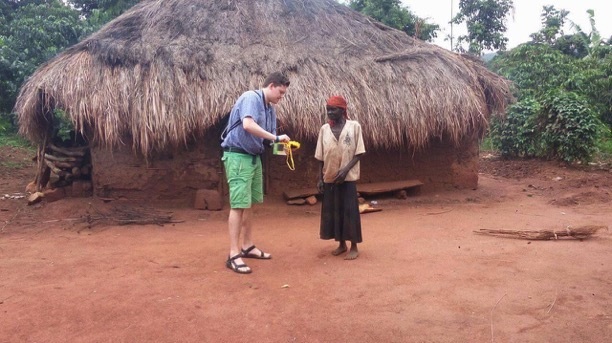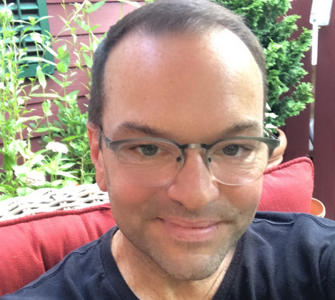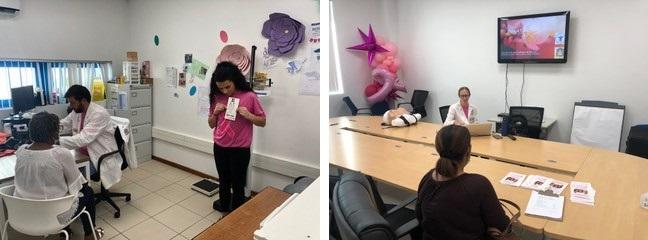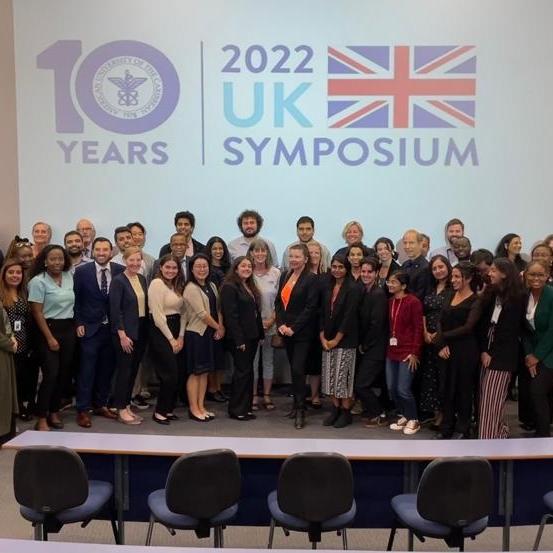I spent my Monday with Dr. Violette in the pediatric department again. The rounds took almost 3 hours and we saw every patient. There were currently 27 patients on the ward that day and they were with their mothers and siblings. The different presentations consisted of dehydration, malnutrition, complications of malaria, HIV, sickle cell anemia, respiratory tract infections, car accidents, and febrile seizures. These are the problems seen most commonly by the pediatrician. After we finished rounding, we stopped by the laboratory and we looked at some sample microscope slides of sickle cell anemia, malaria, and various kinds of leukemia. Nakaseke hospital is limited when it comes to the resources that are available. Patients are often sent to Mulago Hospital in Kampala when they require more diagnostic tests and treatment for their disease. CT scans/MRI scans are usually done in Kampala, along with other specific lab work. If the patient needs a specialist, that is a good enough reason to be sent to Kampala.
Tuesday was a busy day in the theatre. There were 5 C-sections, 2 inguinal hernias, and 1 ovarian cyst performed in the OR. I rounded with Dr. Luyombo in the morning as he was seeing his pregnant patients. We spent the majority of the day in the theatre. I was able to scrub in for most of the cases and I really enjoyed assisting him. Dr. Luyombo is very passionate about his community and considers himself to be a community man. He is involved with many programs in the area and also in Kampala and meets with business owners and other non-profit organization groups to discuss how to help the people living in the community.

I joined Dr. James, Dr. Richard, and Faith on Wednesday at the outreach family planning site in the community. It took us 30 minutes to drive there and there were many women waiting to get different hormone implants. I inserted 2 Implanon implants. This implant lasts 3 years and is a great contraceptive method for these ladies. Many women have these contraceptive implants performed against their husband’s wishes because many people believe that these contraceptive methods take away a woman’s sex drive. This is not true by the way. This is something that the husband does not want. Most women I have encountered have more than 6 children. It goes without saying that the more children a couple have, the more difficult it is to provide for them. This is where family planning comes in and provides these families with the education on how the contraceptives work. I had multiple conversations with men and women about how relationships work in Uganda. This is still a male dominating culture that praises men on how many wives and children they have. A Muslim man is allowed to have four wives and a Christian man can also have multiple wives. I find there to be disrespect for women in this country. Their worth is based more on their fertility and motherhood. If a rich man has a wife and many children and he dies, then the government will take his money and the wife and children are on their own. Society puts these women in a position where they are dependent on their husband financially, which makes it very difficult for them to be independent workers. The majority of Ugandans don’t accept same sex marriage and are very much against homosexuality.
I spent my Thursday morning in the HIV clinic with Dr. Nansamba. We saw many patients together. There was one particular patient that stood out to me. A man in his 40’s walked into the room and he was coughing quite a bit. A nurse came in after this man and said that he should be treated for active tuberculosis. I was very surprised that they didn’t realize the severity of this case and how contagious it was that he was sitting only 4 feet away from us coughing. If this happened in the US, then he would immediately be isolated and anyone who wanted to see him would need to put on protective gown, mask, and gloves. I leaned back in my chair, moved my chair a few feet backwards, and covered my mouth and nose with my wrist. I was very concerned, if not paranoid, that this coughing man with TB would infect everyone in this room. I think Dr. Nansamba saw how I reacted, so she sent the man away with the TB treatment protocol. I may have held my breath, or at least tried to. We saw many patients who had neuropathy due to the HIV virus. We also saw many patients with dark and itchy maculopapular rashes. There was an emergency outreach program that was organized by one of the ladies living in a nearby town. I joined Dr. Richard and Dr. Eric and we took a motorcycle to get there. After getting lost and nearly being knocked off the bike, we arrived at one of the local’s homes. I helped insert 5 contraceptive implants in their arms and I watched multiple IUDs being inserted. We did these procedures in a home, which was small and dark because there was no electricity. The room contained two chairs and a bed, with little room for us to work. We used a headlamp while we were working, otherwise we weren’t able to see a thing. We didn’t have an appropriate examining table or stirrups to get the woman in a position where we could place the intrauterine device. So we improvised. We folded the mattress in half and had the woman lay on it so that her lower body was more elevated. The women took turns lying down on the bed and that is where we inserted the IUDs and implants. I love going out into the community like this and help out. This is something you just don’t see in the United States.
I stayed at the ACCESS clinic on Friday. I saw multiple patients and there was one patient that really stood out to me. A 26 year old woman presented to Nakaseke hospital with abdominal pain, swelling of the legs and abdomen, pallor, blood in the urine, and headache. She gave birth to her son 4 months ago. After the hospital staff took her vital signs and performed a urinalysis, they found that she was hypertensive (164/128, which is very high) and that she had a large amount of protein in her urine (4+ proteinuria). This woman has glomerulonephrotic disease, which means there is a problem with the filtering system of the kidneys. They were planning to send this patient to the Mulago Hospital in Kampala but she was sent to the ACCESS clinic instead. The healthcare cost would have been too much for this patient so she wanted to stay close to home. The patient was brought to the clinic last week so I had been following up on her. Vital signs were taken regularly and the blood pressure was significantly improved after we started her on some diuretics and ACE inhibitors. These medications lowered the blood pressure back to normal levels and it also reduced the edema of the abdomen and lower extremities. Each little issue had to be addressed and different medications were prescribed to take care of each problem. The patient was also given a unit of blood because of her severe pallor and low hemoglobin status. There was also a young child that was brought in to the clinic by a boda-boda (motorbike) with signs and symptoms of malaria. The boy had high fever, chills, night-sweats, body aches, and he even started to seize because of the high temperature. The child was given antipyretic medication, antimalarial medication, and was started on normal IV saline for dehydration. He started to improve very quickly after treatment. I joined Dr. James on Friday afternoon when he went out into the community and gave out flashlights to the families sponsored by ACCESS. We stopped by 8 different homes that were widely spread out throughout the Nakaseke district. Some of the gravel roads were so worn down from the heavy rains and erosion that we had to park the car a couple kilometers away from one of the homes and continue the journey on foot. This gave me the chance to take many pictures and wave to many people along our walk. We visited a woman with HIV, who became susceptible to toxoplasmosis and became blind in both eyes. When she heard we arrived, she fell to her knees and showed great humility. She was very thankful for the light that was given to her family even though she was blind. I brought my bag of lollipops and I gave her one. Her hands were very muddy for she was working in the field and digging with her hands. When I handed her the lollipop, she extended both of her hands together. I grabbed her by the hand and placed the lollipop between her fingers so she would know that she’s holding a lollipop. I had compassion for her and wished I could have done more. One family we visited had 10 children. The mother of the children passed away and the grandmother took her place to take care of the children. The father is not known and the children probably have different fathers. The grandmother and her 10 grandchildren all live in one home build out of mud and straw. She takes care of these children along with some livestock and she works in the field every day. Her home was surrounded by cows, chickens, pigs, and stray dogs. The woman is doing her best to support her grandkids and I think she is doing a good job. Every time I go out into the community, there are always some families that touch me with their stories and I am left with admiration for their way of life. Behind every disease and illness is a human being longing to be treated and healed. Patients want to be listened to and don’t want to be classified as an interesting case ready to be published in a medical journal. I have not come to treat the disease but to treat the person. I have seen multiple posters that say “we treat, Jesus heals”. I pray for this healing every day.
I met with Dr. James on Saturday morning and we saw some more patients in the clinic. There were only a few and I saw them the day prior. We took a motorcycle and drove to the tallest hill in Nakaseke. We left the motorcycle along the side of the road and walked the rest of the steep incline to the summit. The summit had large radio towers and satellites. The hospital is located at the base of the hill and I always use this hill to orient my sense of direction. The view was incredible and I was able to see most of the Nakaseke district. I went on another motorbike ride that afternoon with the same person that took me last week. We rode the bike for more than 2 hours and the views were just breath-taking. The sky was cloudy and it looked like some heavy thunderstorm clouds were moving in our direction. The temperature was just perfect as the sun was covered and a cool breeze kept us from sweating. We rode through many villages and I waved numerous times to many children and families. Many people waved back, children screamed out to me with greetings and some tried to run after us. I always feel like a celebrity when I’m out in the community because of how easy I stand out. If I came with a big group of white Americans, the attention would have been distributed among the group, but since I came alone all the attention goes to me. People stare at me because I am white and that is something they don’t see very often, especially in a rural setting like Nakaseke. They also stare at me because of what I represent. I represent western civilization that is known for being wealthy and well-established and I think the Ugandans are just curious why I am here. Just because I have more money (or money borrowed by the US government) than most of the people here, doesn’t mean that my life is more valuable than theirs. Society loves to judge a person based on their income. They calculate a person’s net value based on how much they earn, and that is supposed to figure out how much a person is worth. This makes the rich appear more important than the poor. Isn’t every individual unique and made in the image of God? I don’t believe in rankings and how some people can be considered “more valuable” than others. We are all brothers and sisters born into this world naked and helpless and that is how we will leave this world.
I finished up my third week in Uganda. The time has gone by very fast and I am making the most of this experience. I miss my wife very much but we both know this experience is temporary and that I will come back home very soon. I wish she was by my side during this experience. The expectations I had for this Uganda global elective have been met and I am getting the most experience I can get. I love being involved in multiple programs and groups which help me make connections and meet people on a personal level. I love the people’s stories because it gives me hope and makes me appreciate many things in my own life. I am thankful to be in Africa and for this incredible opportunity to learn more about global medicine.




